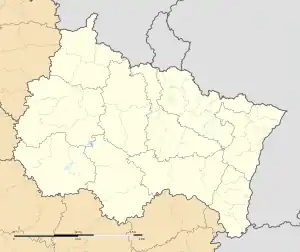Haumont-près-Samogneux | |
|---|---|
 The chapel in Haumont-près-Samogneux | |
.svg.png.webp) Coat of arms | |
Location of Haumont-près-Samogneux | |
 Haumont-près-Samogneux  Haumont-près-Samogneux | |
| Coordinates: 49°16′25″N 5°21′12″E / 49.2736°N 5.3533°E | |
| Country | France |
| Region | Grand Est |
| Department | Meuse |
| Arrondissement | Verdun |
| Canton | Belleville-sur-Meuse |
| Intercommunality | CA Grand Verdun |
| Government | |
| • Mayor (2020–2026) | Gérard Gervaise |
| Area 1 | 10.81 km2 (4.17 sq mi) |
| Population | 0 |
| • Density | 0.0/km2 (0.0/sq mi) |
| Time zone | UTC+01:00 (CET) |
| • Summer (DST) | UTC+02:00 (CEST) |
| INSEE/Postal code | 55239 /55100 |
| Elevation | 194–355 m (636–1,165 ft) (avg. 250 m or 820 ft) |
| 1 French Land Register data, which excludes lakes, ponds, glaciers > 1 km2 (0.386 sq mi or 247 acres) and river estuaries. | |
Haumont-près-Samogneux (French pronunciation: [omɔ̃ pʁɛ samɔɲø], literally Haumont near Samogneux) is a commune in the Meuse department in Grand Est in north-eastern France.
The capture of the town by the German Fifth Army began the Battle of Verdun during World War I in 1916.[2] Since then, it has been unoccupied (official population: 0) along with Bezonvaux, Beaumont-en-Verdunois, Louvemont-Côte-du-Poivre, Cumières-le-Mort-Homme and Fleury-devant-Douaumont.
During the war, the town was completely destroyed and the land was made uninhabitable to such an extent that a decision was made not to rebuild it. The site of the commune is maintained as a testimony to war and is officially designated as a "village that died for France." It is managed by a municipal council of three members appointed by the prefect of the Meuse department.
See also
References
- ↑ "Populations légales 2021". The National Institute of Statistics and Economic Studies. 28 December 2023.
- ↑ Robson, Stuart (2007). The First World War (1 ed.). Harrow, England: Pearson Longman. p. 54. ISBN 978-1-4058-2471-2 – via Archive Foundation.